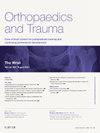解开尺骨侧手腕疼痛
Q4 Medicine
引用次数: 0
摘要
尺骨侧腕关节疼痛是一种常见的症状,然而该区域独特而复杂的解剖结构给诊断带来了广泛的挑战。尺侧腕关节疼痛可由以下原因引起:骨质、软骨或韧带损伤;腕骨或尺桡关节远端关节不稳;骨撞击;神经压迫;肌腱功能障碍或关节炎。这篇综述文章的目的是详细介绍重要的相关解剖和相关病理解剖,以便了解病情;并强调相关的历史,检查结果,和调查,可以帮助破译问题,并作出正确的诊断。本文章由计算机程序翻译,如有差异,请以英文原文为准。
Unravelling ulna-sided wrist pain
Ulna-sided wrist pain is a common presenting condition, however the unique and complex anatomy of that area presents wide-ranging diagnostic challenges. Ulnar-sided wrist pain can be due to: bony, cartilaginous or ligamentous injury; joint instability in the carpus or distal radioulnar joint; bony impingement; nerve compression; tendon dysfunction or arthritis. The aim of this review article is to detail the important relevant anatomy and the associated pathoanatomy in order to understand the conditions; and to highlight relevant history, examination findings, and investigations that can help decipher the problem and make a correct diagnosis.
求助全文
通过发布文献求助,成功后即可免费获取论文全文。
去求助
来源期刊

Orthopaedics and Trauma
Medicine-Orthopedics and Sports Medicine
CiteScore
1.00
自引率
0.00%
发文量
57
期刊介绍:
Orthopaedics and Trauma presents a unique collection of International review articles summarizing the current state of knowledge and research in orthopaedics. Each issue focuses on a specific topic, discussed in depth in a mini-symposium; other articles cover the areas of basic science, medicine, children/adults, trauma, imaging and historical review. There is also an annotation, self-assessment questions and a second opinion section. In this way the entire postgraduate syllabus will be covered in a 4-year cycle.
 求助内容:
求助内容: 应助结果提醒方式:
应助结果提醒方式:


